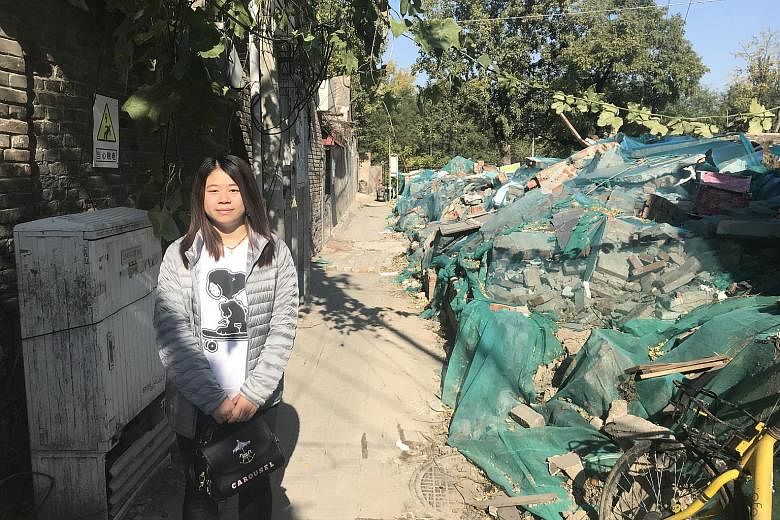BEIJING/SHANGHAI - Beijing native Yuan Momo first realised the impact of China's one-child policy on people during the 2008 Sichuan earthquake, in which several thousand school children were among the 90,000 who died.
Overnight, their parents became "shidu", which literally means those who have lost their only child.
"Many parents were already in their 40s and it was not very possible for them to have a second child," said Ms Yuan, 35, a regional manager at a foreign bank.
"It was the first time I became aware of the social implications of this policy. What are these people to do in their old age?"
Ms Yuan, born in 1983 during the initial years of the one-child policy, was one of millions of children who grew up with no brother or sister.
"I was a very happy child. All the adults doted on me," she said.
But in her second year out of university in 2006, her father, then 59, was stricken with colorectal cancer.
"I felt so helpless being an only child," she recalled. "That feeling struck me very hard."
Fortunately, her older cousins helped her tide over the crisis.
So when she got married several years later - her husband too is an only child - she was determined to have two children.
"They will have each other. They won't be lonely or helpless when anything happens," she said.
GROWTH ABOVE ALL ELSE
The official line when China's draconian one-child policy was officially launched in 1980 was that curbing population growth would speed up economic development.
With the decade-long Cultural Revolution rendering the country a near basket-case economy, paramount leader Deng Xiaoping wanted to open China's doors to foreign investments and introduce market reforms to spur growth.
The aim was to ensure that the population would not grow beyond 1.2 billion by 2000.
The policy succeeded in keeping China's total fertility rate (TFR) at between 1.5 and 1.6 for a quarter of a century, well below the replacement rate of 2.1.
It also resulted in a population pattern characterised by a rapid increase in the working-age population and a decrease in the dependency ratio (the ratio of dependants to the working-age population), Professor Cai Fang, vice-president of the Chinese Academy of Social Sciences, wrote in a recent paper.
Billed as the "demographic dividend" by economists, it was a key driver of China's unprecedented economic growth during nearly the entire period of economic reform, Prof Cai noted.
"A favourable population structure thus helped China create the necessary conditions for high potential growth that was characterised by a high savings rate, sufficient supply of labour, rapid improvement of human capital and radical resource reallocation through labour mobility," he concluded.
BUT AT WHAT COST?
The one-child policy has long been criticised for violating people's basic rights. Stories abound of forced abortions and sterilisation by local officials anxious to meet government targets and of female infanticide by families favouring boys to carry on the family line.
Sociologist Cao Jinqing, in his book China Along the Yellow River, wrote: "A family planning cadre who has worked in the township government for eight years said frankly: 'In order to promote family planning, I have arrested people, confiscated cattle, torn down houses, and committed many illegal and chaotic acts. It wouldn't be too excessive to sentence me to 20 years' imprisonment for it.' "
Then, there were the "heihaizi", or black children, whose births are unreported by their parents to avoid financial or social penalties.
According to China's 2010 population census, there were 13 million unregistered citizens, or almost one per cent of the country's total population. Officials have said that most of them are children born outside the country's one-child policy.
In the case of Ms Li Xue, 25, her parents simply could not cough up the 5,000 yuan (S$998) "penalty" imposed by local authorities in Beijing. Their combined incomes came up to only several hundred yuan a month.
Her mother had a medical condition that did not allow for an abortion even though the family already had an eight-year-old daughter, she told The Straits Times.
So Ms Li did not get vaccinated like other babies, she could not go to school when she turned seven, and without an identification card, she could not travel out of Beijing.
She managed to rectify her lack of status only after the one-child policy was scrapped at the end of 2015. Even then, she had to go to court to win the right to be registered.
"In my family register, it reads: August 18, 2016, Li Xue registered her birth," she said with a wry grin.
"I have to stress that the government did not allow me to get registered after they ended the policy. I'd filed a suit with the courts and the judge ruled that I can be registered."
DEMOGRAPHIC CHALLENGES NOW
Social costs aside, the one-child policy caused unintended demographic problems that could hurt future growth - a rapidly ageing population, gender imbalance and a shrinking workforce.
Analysts have warned that the nation of nearly 1.4 billion people - and the world's No 2 economy - could get old before it gets rich.
Last year, there were 241 million Chinese aged 60 and older, making up 17.3 per cent of the population. By 2050, one in three, or 480 million, will be in that age group.
"It looks like we have gone one big circle," said Beijing-based economist Hu Xingdou, noting that from the macroeconomic standpoint, China now needs to augment its population for sustained growth.
The one-child policy was relaxed in 2013 to allow couples who are the only child to have a second baby.
When it became a full two-child policy in January 2016, the number of births that year jumped nearly 8 per cent to 18.46 million, the highest since 2000. Last year, it fell 3.5 per cent, possibly a sign that the spike was due to some couples' pent-up desire for a second child.
However, the one-child policy has fundamentally altered the views of other couples on child-bearing as well as family values.
Ms Coco Zou, 32, a graphic designer in Shanghai, has no plans to have a second child.
"I don't want my career to be affected and it's too financially stressful to raise another child," she said.
"Both me and my husband are the only child in the family, we think it's quite good to just have one child."
THE END IS NEAR?
In recent months, population experts have been calling for birth control policies to be completely lifted, and for couples to be given incentives such as tax reliefs and child-care subsidies to have two children.
Population expert Zeng Yi from Peking University argued in a recent commentary that if the TRF could be raised from the current 1.7 to 1.9, and maintained at that level, the TRF could slow to 1.77 by 2050 due to a higher rate of urbanisation.
This means China will reach a population peak of 1.44 billion in 2030 before declining. This will result in a much larger labour force than the current two-child policy.
"The 40 years of family planning policy is China's biggest mistake since 1949," said Mr He Yafu, an independent demographer based in Guangdong and a long-time advocate of policy changes.
"For a policy that should not have existed in the first place, it should be scrapped as soon as possible," he added, predicting that the policy will be totally scrapped next March.
Professor Hu thinks it does not matter if the policy change has come a tad too late as long as the people are duly respected.
"We should not treat the people as tools. All policies should exist to help the people lead a happy life. So what if the birth rate is high, but the people are unhappy? China does not have to pursue a high growth rate indefinitely."



